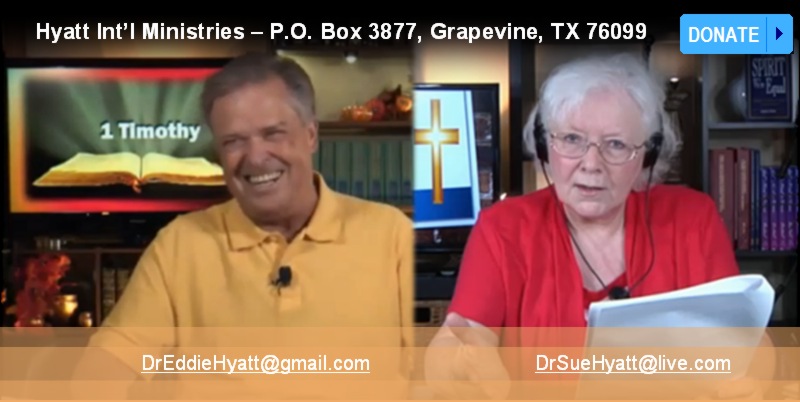|

Hyatt International MinistriesTaking Spiritual Awakening & Biblical Thinking to the Nationswith Drs. Eddie & Susan Hyatt & FriendsBy Eddie L. Hyatt Thus says the Lord to the house of Israel, seek Me and live. But do not seek Bethel, nor enter Gilgal, nor cross over to Beersheba. Seek the Lord, and Live (Amos 5:4-6a). Definition: To “seek the Lord” means that we move from an approach to God that is centered in ourselves with our own self-interests at the forefront, to an approach that is centered in Him with His interests at the forefront of the relationship. We must no longer relate to God on the basis of what He can do for us, but on the basis of how we can know Him and be more fully conformed to His will and purpose. Here some practical suggestions for making the transition. Understand that I am not suggesting that we should never ask God for anything. But as a matter of principal, we must change our attitude from one that is ego-centered in me and my needs and desires to one that is centered in the Lord, His kingdom, and His will. DON’T SEEK GIFTS, SEEK THE GIVER OF GIFTS
The LORD ALMIGHTY sent me this message: Say to all your people and your priests, “During those seventy years of exile, when you fasted and mourned in the summer and at the festival in early autumn, was it really for Me that you were fasting? And even now in your holy festivals, you don’t think about Me but only of pleasing yourselves (Zech. 7:4-6). DON’T SEEK HEALING, SEEK THE HEALER
The only thing on my Dad’s mind at this time was that for 5 years he had ignored a call from God to full-time ministry. With only a 4th grade education and a family to care for, full-time ministry seemed impossible and he had told no one. Now, faced with the death of his son, he stepped into a rest room and prayed a 3-word prayer, “Lord, I’m ready!” It was a prayer of surrender. It was a prayer in which God’s interests were at the forefront rather than his own. Suddenly the gift of faith dropped into his heart and he knew that Pete was going to be OK. He didn’t know how he knew, but he knew. After about an hour, one of the doctors returned to the waiting room and said, “Mr. Hyatt, there has been a higher power here tonight. We know your son had a broken rib that had punctured his lung. But we have completed the x-rays, the bleeding has stopped, and he doesn’t have a broke bone in his body.“ My brother Pete is well and healthy today. How did this miracle happen? My Dad put God’s interests ahead of his own. Think about it! He did not pray a prayer for healing or rebuke the devil. He did not call the intercessory prayer group or the healing evangelist. When he put God’s interests at the forefront, the power of God was manifest in an incredible way. I am convinced that we do not see greater miracles of healing today because we are more preoccupied with healing than we are the Healer. If we will put the interests of the Healer ahead of our own, His healing power will be mightily revealed in our midst and we will see another “healing revival.” DON’T SEEK PROVISION, SEEK THE PROVIDER
In the midst of seeking God and experiencing his presence and power, Pastor Boddy and the people of All Saints Anglican Church almost forgot about the financial debt. But in the midst of the revival, without any fundraising tactics on their part, all the money to pay the dept came in. They were so impressed that they had inscribed in stone on the outside wall of their building, “The fire fell and burned up the debt.” The inscription is still there today. When they stopped seeking money and began to seek God, everything they needed was supplied. Psalm 34:10 says, The young lions do lack and suffer hunger, but they that seek the Lord shall not lack any good thing. In spite of all the talk about a transfer of worldly wealth into the hands of believers, it will never happen to a generation that is seeking money, but to the generation that is seeking Him. DON’T SEEK REVIVAL, SEEK THE GOD OF REVIVAL
In his Lectures on Revival, Charles Finney tells of the numerous invitations he had received from churches and pastors wanting revival in their communities and asking him to come. Finney goes on to say that after examining their motives for revival, he refused to go to many of them because their motives for wanting revival were all wrong. Some wanted revival to raise their status and importance in the community. Others wanted revival to bring in more people, which would mean they could build a new and larger building. Some wanted a revival so that they would feel more important than another congregation with whom they were competitive. Finney called their motives for wanting revival an “abomination” and he refused to respond to their invitations. True revival comes, not by seeking revival per se, but by seeking the God of revival. CONCLUSION
|
